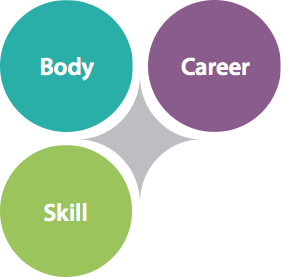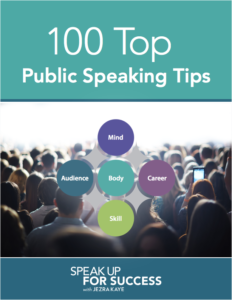 To uhm is human; to pause, divine.
To uhm is human; to pause, divine.
—Shakespeare
OK, The Bard didn’t quite say that.
But he might have, if he’d been deluged with the uhm’s, uh’s, like’s, y’know’s, whatever’s, and really’s we all hear everyday.
Sometimes, we even hear them coming out of our own mouths.
Perish the thought — or rather, the uhm.
What’s the Problem with Filler Words?
There’s no intrinsic problem with meaningless filler words like uhm.
We all use them occasionally, and that doesn’t diminish the value of what we have to say.

But these “null syllables” are like empty calories. And as with empty calories, there’s an opportunity cost:
- It’s not that small quantities of soda or York Peppermint Patties will kill you.
- It’s that they crowd out the other more nutritious choices you might be making.
Similarly, when your speech or comment has lots of filler words, you’re passing up another option that should be a staple on your speechmaking menu: silence.
Silence Isn’t Just Golden — It’s One of Your Most Useful Public Speaking Tools
Silence —the lack of sound that occurs when you pause from speaking — has a value that empty uhm’s lack. It:
- Gives you a quick break, and lets you recharge;
- Lets your audience absorb what you just said;
- Builds anticipation for what you’ll say next; and
- Let’s you speak with more drama and intensity, because pauses are more dramatic and intense than filler words!
This makes silence a much better bet for public speaking than filler words or other empty syllables.
But how do you break the “uhm” habit and learn to confidently pause instead? Here are two things to try:
Give Those Uhm’s the Double Whammy
Sometimes, when you’re breaking a habit, a two-pronged approach works best. So here’s how to hit your habit of using filler words from two directions at once, and hopefully squeeze it out from the middle:
- The “Punch Buggy” Maneuver

If you’ve ever taken a road trip with a young child, you may have been exposed to a game called “Punch Buggy.”
The buggy in the title is a Volkswagon, preferably of the vintage sort, and the game is simple:
Whoever spots a VW first gets to punch the person next to them in the arm and yell “Punch Buggy.”
Yes, it’s silly, but it gets your attention; so ask your friends to do this whenever they hear you use filler words. (Well, skip doing it in high-powered meetings; and the yelling of “Punch Buggy” is optional.)
- “One Mississippi”
It takes about a second to say the word “Mississippi”; hence the practice, which you may know, of counting down time by saying “One Mississippi, two Mississippi, three Mississipi…”
Next time you’re speaking out loud to somebody, try silently repeating the phrase “One Mississippi” at the end of every sentence.
While you’re doing this, you won’t be talking; therefore, by definition, you’ll be adding silence to the exchange, in place of the filler words that used to occupy that space.
To Take Away Sound, Add Silence
It’s just that simple: To remove sound (in this case, null syllables, add silence
- Do the “One Mississippi” exercise until it’s second nature.
- Then add another second of silence… and another.
- And if you find yourself backsliding into uhm’s, y’know’s, really’s, etc., ask your friends for a “Punch Buggy.”
Before you know it, you’ll have built your tolerance for adding silence — and the filler words that used to crowd out your pauses will be just a very dim memory!

 Buy 100 Top Public Speaking Tips: The Book!
Buy 100 Top Public Speaking Tips: The Book!
In 25 years of speaker coaching, I’ve helped my individual speaker coaching clients develop their strengths and skills to become authentic and effective communicators.
Along the way, I’ve developed tips for everything from small talk to speaking up in meetings, from managing fear to making an impact.
And now, I’ve shared it all in 100 Top Public Speaking Tips: The Book. This beautifully designed PDF booklet is searchable, clickable, and categorized, so that you can find what you need, instantly.
